

COVID-19: There is no returning to normal after the crisis. As the world recovers from the COVID-19 pandemic, McKinsey & Company’s 'three horizons' framework offers a helpful model.
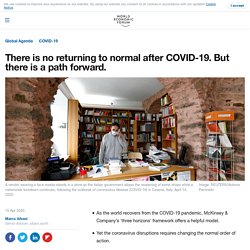
Yet the coronavirus disruptions requires changing the normal order of action. How Will the Coronavirus Reshape Democracy and Governance Globally? The new coronavirus pandemic is not only wreaking destruction on public health and the global economy but disrupting democracy and governance worldwide.
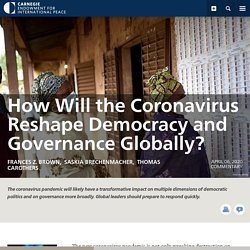
It has hit at a time when democracy was already under threat in many places, and it risks exacerbating democratic backsliding and authoritarian consolidation. Already, some governments have used the pandemic to expand executive power and restrict individual rights. Yet such actions are just the tip of the iceberg. The coronavirus will likely transform other pillars of democratic governance—such as electoral processes, civilian control of militaries, and civic mobilization—and potentially reset the terms of the global debate on the merits of authoritarianism versus democracy. This article surveys this wide spectrum of effects. Frances Z. Frances Z.
More > The overall picture is foreboding. Centralizing Power and Closing Democratic Space Four interrelated areas of concern stand out in this rush toward new emergency powers and restrictions. Latest: Governments step up surveillance to fight coronavirus. Coronavirus is changing the world in unprecedented ways.
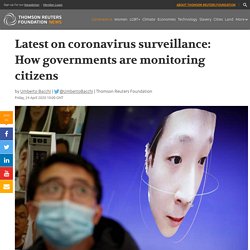
Subscribe here for a daily briefing on how this global crisis is affecting cities, technology, approaches to climate change, and the lives of vulnerable people. By Umberto Bacchi This story is being regularly updated with new developments. TBILISI, March 27 - The coronavirus pandemic has pushed governments globally to impose draconian lockdowns, travel bans and tighter border controls in a bid to stem the spread of the contagious virus. Coronavirus: our latest stories From China to Russia, containment measures have often come with heightened surveillance, as authorities use artificial intelligence (AI) and big data to keep tabs on the population, alarming human rights activists and privacy experts. Here is a rundown of governments rolling out technology to track and contain the outbreak: In South Korea, private software developers have set up websites and apps to help people track cases and shun places where infected people have been. After coronavirus: Six predictions for a new world order.
Spiro. This report is a follow-up to one where I cover how Michael Ryan of the WHO stated in a press briefing how the WHO (which is of course in the pocket of Bill Gates) now believes it is time to start removing people from their homes.

I know many people, especially those of you who are in the US, think that could never happen here … well, those are probably the same people who thought just a couple months ago that it would be impossible to lockdown the entire country because people would never put up with it and because we have rights… right? This is being said even as we are ON lockdown. For those of you who can’t wait for the government to lift the lockdowns, as many states are preparing to do, remember that we were told things will not go back to normal until there is a vaccine and the entire planet has largely received it… we have also been told about how we must embrace the new normal.
Part of that new normal is contact tracing. So what exactly is contact tracing? Dr. Andrew Kaufman: They Want To Genetically Modify Us With The COVID-19 Vaccine. We Mapped How the Coronavirus Is Driving New Surveillance Programs Around the World. Coronavirus: How to cope with living alone in self-isolation. Image copyright Lucia Buricelli After years of living with others, Lucia was excited to finally have a place to herself.
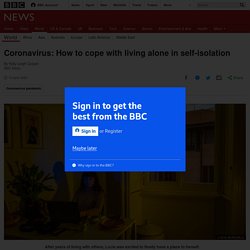
The photographer had recently moved back to Italy from New York. She enjoyed spending time on long, meandering walks with her camera, and going out for food with friends. But within a couple of months Milan, where she lived, had become the epicentre of Europe's coronavirus outbreak. She and millions of other Italians were ordered into lockdown, told to stay home unless absolutely necessary. There will be no 'back to normal' The pandemic will change the world permanently and profoundly.
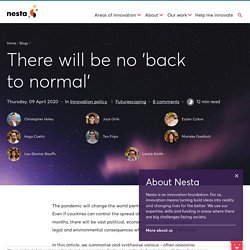
Even if countries can control the spread of COVID-19 in the coming months, there will be vast political, economic, social, technological, legal and environmental consequences which will last many decades. In this article, we summarise and synthesise various - often opposing - views about how the world might change. Clearly, these are speculative; no-one knows what the future will look like. But we do know that crises invariably prompt deep and unexpected shifts, so that those anticipating a return to pre-pandemic normality may be shocked to find that many of the previous systems, structures, norms and jobs have disappeared and will not return.
For this reason, adaptation and innovation are more important than ever. World Order in Post-Coronavirus Era — Valdai Club. However, we are facing a multi-dimensional equation, to respond to the question that what the international order will look like in the post-coronavirus era.

In the coronavirus crisis, we are encountering three parallel realities including governments, nations, and the emotions of elites’ public consciousness, who have portrayed different manifestations. “Earth School” launches to keep students connected to nature in the time of COVID-19. Nairobi, 22 April 2020 - In response to the COVID-19 crisis, an unprecedented coalition has come together to launch “Earth School,” which provides free, high-quality educational content to help students, parents and teachers around the world who are currently at home.

Initiated by the United Nations Environment Programme (UNEP) and TED-Ed, Earth School takes students on a 30-day “Adventure” through the natural world. The curated Earth School content features videos, reading materials and activities — which will be translated into 10 languages — to help students gain an understanding of the environment while considering their role within it. This is the biggest online learning initiative in UNEP’s history and is available for free on TED-Ed’s website. According to the UN Educational, Scientific and Cultural Organization (UNESCO), more than 1.5 billion learners are affected by COVID-19 school closures. The future of health diagnostics. COVID-19: Job displacement in emerging markets. The Covid-19 shock has laid bare some of the most vulnerable parts of our economies.
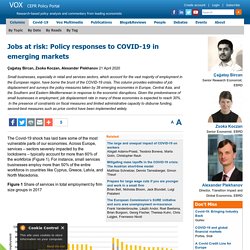
Across Europe, services – sectors severely impacted by the lockdowns – typically account for more than 60% of the workforce (Figure 1). For instance, small services businesses employ more than 50% of the entire workforce in countries like Cyprus, Greece, Latvia, and North Macedonia. Figure 1 Share of services in total employment by firm size groups in 2017 Source: Eurostat.Notes: Firm size definition follows Eurostat. How much unemployment are we facing? Many businesses across Europe have already engaged in immediate layoffs or furloughed their workers.
Combining this information with sector-level employment figures from Eurostat, as of end-2019, suggests that 20 to 25% of all payroll workers across Europe may already be out of work (Figure 2). Figure 2 Expected layoffs as % of employment in the short and long terms Many self-employed people are also facing loss of income. Source: Eurostat References. Global warming the new normal. Earth Day at 50: Five Ways to Honor the Legacy and Change the World. A time of crisis is not just a time of anxiety and worry.
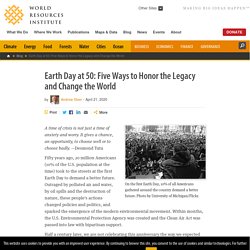
It gives a chance, an opportunity, to choose well or to choose badly. —Desmond Tutu Fifty years ago, 20 million Americans (10% of the U.S. population at the time) took to the streets at the first Earth Day to demand a better future.